Hûw Steer's Blog, page 21
May 1, 2022
Comics Are Stupid: Superman and the Nazis from Mars. Starring Orson Welles.
When I was very young – like 5 years old – and absorbing pop culture like a sponge, as children do, I’d just figured out what superheroes were. And so my father went into the loft – or possibly one of his father’s many lofts and sheds (there is a reason I have so much stuff, and it’s genetic) – and came back down with this:
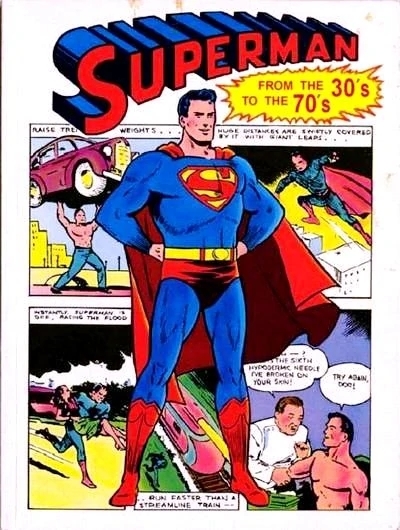 Superman: From the 30’s to the 70’s (1971)
Superman: From the 30’s to the 70’s (1971)Almost 400 pages of Superman comics. He’d had it since he was 6 or 7. And while he did make a point of not actually ‘giving’ it to me (but whose bookshelf has it been on for the last two decades, father?) I absolutely devoured it, time and time again. This book is a glorious snapshot of Superman in the Golden and Silver Ages of comics, from Action Comics #1 to the insanity of the late 60s. There are awkward political analogies, a delightfully silly story where Clark Kent and Bruce Wayne just happen to go on the same cruise holiday and run into some smugglers, Mr Mxyzptlk, and more.
But most importantly, there is this:
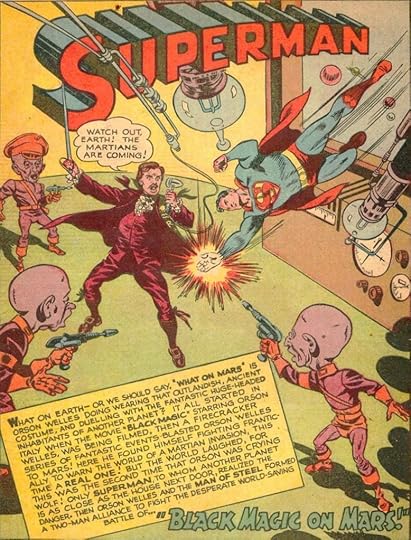 Yes, what on Earth is happening, DC Comics? Superman #62 (1950)
Yes, what on Earth is happening, DC Comics? Superman #62 (1950)Just let that whole image sink in for a minute. We’ve got Mars Nazis, we’ve got Superman. And we’ve got a legendary sidekick, one of the most famous men ever to team up with the Man of Steel… Orson Welles. The actor.
As you may have surmised, things are about to get weird.
To set the scene: this is, apparently, January 1948, because Welles has literally just left the set of Black Magic. (Though as the film was apparently shot in Rome, not nonspecific-America, and because this comic is also about Superman and Orson Welles fighting Nazis from Mars, it may not be wholly accurate.) Conveniently, Orson is on his way to a fancy dress party – so when he accidentally boards an unmanned mission to Mars, he’s still in his full Caligostro costume.
Yes, you heard me. Orson literally wanders into the middle of a cutting-edge scientific experiment and accidentally goes to Mars. And nobody notices.
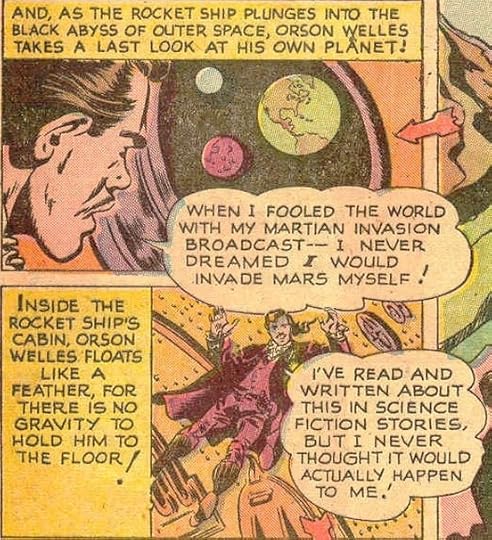 Nor did we, Orson. Superman #62 (1950)
Nor did we, Orson. Superman #62 (1950)(Tangent: I love the little arrows showing you the panel order here. Heaven forbid that you get confused when reading about Orson Welles and Superman fighting Nazis from Mars.)
This comic really doesn’t waste any time, because literally three panels later Orson has been captured by Martians and established that they’re all really big Hitler fans. Their leader is called Martler. Subtle.
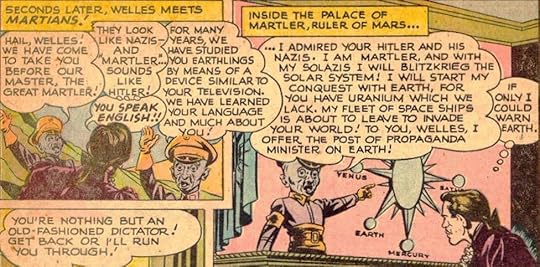 There’s clever and subtle villain names, and there’s Martler. Superman #62 (1950)
There’s clever and subtle villain names, and there’s Martler. Superman #62 (1950)But how can Orson stop these dastardly Mars-Nazis? (Marzis? Oh, apparently they’re called ‘Solazis’. That… doesn’t even make sense. And I’m saying that of this comic.) By doing the thing he was most famous for at the time: broadcasting a radio message to the world warning them of an imminent Martian invasion. This, dear audience, is the joke the writers have been rushing us towards for the whole comic so far: Orson Welles trying to warn the world of a real War of the Worlds scenario and nobody believing him.
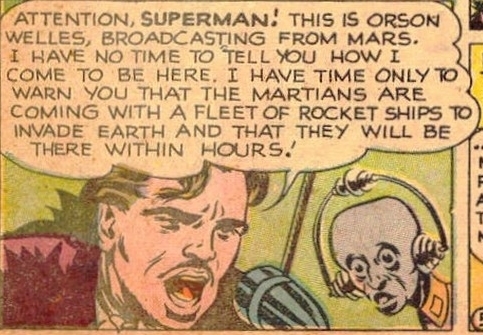 He fought off a dozen Martians with a prop sword to get to the transmitter, ok, there is literally no time to explain. Superman #62 (1950)
He fought off a dozen Martians with a prop sword to get to the transmitter, ok, there is literally no time to explain. Superman #62 (1950)As this is a Superman comic, however, Superman does actually have to show up at some point. Despite Orson’s track record of hoaxes Superman instantly believes him without a second’s critical thought. Off he flies to Mars, where he and Orson beat up all the Mars Nazis without much trouble.
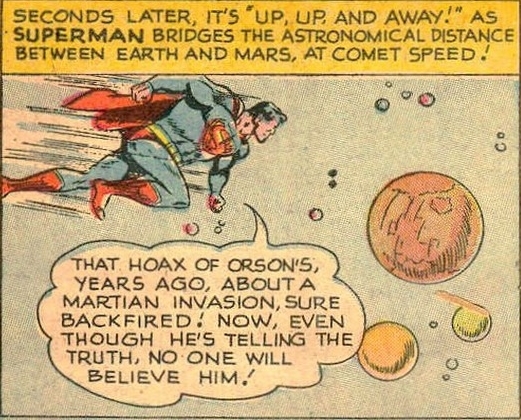 Superman #62 (1950)
Superman #62 (1950)In fact Superman is largely throwing rocket ships around while Orson does most of the punching and kicking and… stage magic?
 Big Pointy Teeth, apparently. Superman #62 (1950)
Big Pointy Teeth, apparently. Superman #62 (1950)Fun fact: Orson Welles was actually a lifelong magician, starting with magic acts for US troops during WW2 and performing on TV throughout his career, including on a magic show of his own in the 80s. It feels bizarre to say this, but the writers of Superman #62 actually got their facts right.
Anyway, in classic early Superman fashion, he slingshots a moon at some rockets, captures all the Martians, Welles does some ventriloquism (because he can speak Martian now apparently) and somehow convinces an entire planet of Nazis to calm down and go home, and he and Orson return to Earth without any further incident.
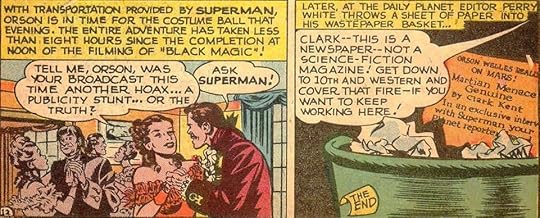 Superman #62 (1950)
Superman #62 (1950)Every time I read this comic, I appreciate how utterly ridiculous and charming it is. The basic premise is utterly bizarre – which shows in the very hasty getting-to-the-point at the start of the issue – but once it’s all set up, the writers just ran with it and had a good time. Comic-Orson is a surprisingly entertaining character – he hurls himself happily into danger without a moment’s thought, and seems genuinely thrilled at the chance to beat up some villains-of-the-week.
To this day I’m still not quite sure why it was written: these days, a famous actor appearing in a comic would inevitably be some piece of product placement or advertisement. And it’s very clear that this is some sort of Orson Welles ad: notably it is Orson Welles who draws Superman’s attention to the threat, Orson Welles who beats up Martler, Orson Welles who – in an unexpected flash of advanced physics – tells Superman how to deflect the Martian rockets. This really is Orson Welles #62, not Superman. But the only Welles project mentioned is Black Magic – a film that had been released 5 months earlier. Welles released two other films before this comic was published. It seems a bit late for an advert, but it’s all I can think of – and given that Black Magic is pushed aside almost immediately in favour of the whole Martian Nazi plot, it wouldn’t even be a very good advert even if it was.
Maybe it was just to boost sales; maybe Welles was just secretly a big fan of Superman. To my knowledge there’s nothing on record about whether he even read this comic. But I hope he did. Because there’s something delightful about Superman #62, even if it is a publicity stunt. It has little of the crassness of modern adverts and celebrity endorsements – there’s no Raid: Shadow Legends here. It’s just a daft story about an actor beating up some Nazis with his best friend Superman. And there’s nothing wrong with that.
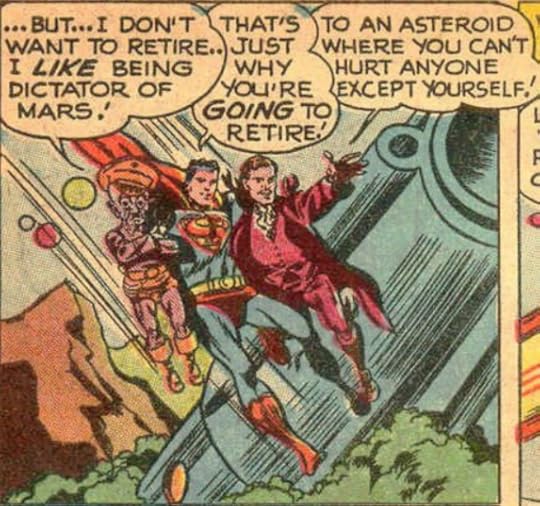 …are we meant to feel sympathetic to Martler here? Superman #62 (1950)
…are we meant to feel sympathetic to Martler here? Superman #62 (1950)
April 24, 2022
Riftwar Re-Read #4 – Legends of the Riftwar
I’m trying to space these Riftwar posts out a bit, but I wanted to get my thoughts down on these books before they fade. This week we’re looking at the Legends of the Riftwar spinoff trilogy – another set of books that weren’t just written by Raymond E. Feist.
For series context, unlike the Empire trilogy with Janny Wurts – which was written right after the original Riftwar trilogy – the 3 Legends books were written almost two decades later – between the Serpentwar books and the Conclave of Shadows. Despite that they’re all set during the original Riftwar, i.e. during Magician. Each was written by Feist and a different collaborating author – mostly by the collaborating author, according to Feist’s afterwords, with Feist himself basically coming in to do a stylistic polish and sort out the actual plot. It’s a nice way to get some alternate styles of storytelling into the series – with, unfortunately (in my opinion), varying degrees of success.
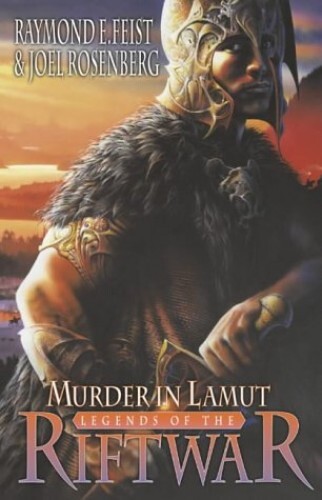
Murder in LaMut, written with Joel Rosenberg, is a murder mystery story, and a good one. Three bitter but lovable mercenaries are stuck in the frozen midwinter of LaMut, forced to get involved in local politics – and solve some murders – when all they want to do is get their pay and get the hell out of town. It’s a well-written story, and the three leads are a very charismatic trio. Dry wit, pithy insights on human nature and touching character moments abound. But while it’s an excellent story, full of intrigue and some great character development, it doesn’t feel all that Riftwar-ey. The book’s afterword reveals that the three mercenaries are essentially borrowed wholesale from one of Rosenberg’s other books, and that makes sense. It’s a great standalone fantasy story, but doesn’t really draw much from or add much to the Riftwar overall. But I still very much enjoy it and would recommend reading it, for the banter and the characters if nothing else.
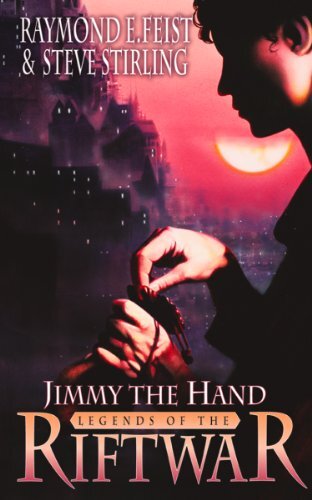
Jimmy the Hand was written with Steve Stirling. On the face of it, I should love it: my last post revealed how much I like Jimmy as a character, and this book is presented as being all about Jimmy. And the bits that are all about Jimmy are really good. We get to properly see the underworld of Krondor for the first time; how the guild of thieves operates, how Jimmy fits in. In the first few pages there’s a gripping prison-break sequence that even manages to fill in a few gaps in the background politics of the original trilogy. So far, so good. Stirling captures Jimmy nicely as a character in his pre-Silverthorn form. I was excited for the rest.
Unfortunately, the story then stops being about Jimmy at all. The book is actually about a farmer’s daughter stumbling across a rural baron resorting to necromancy to resurrect his dead wife. He’s kidnapping children for some nasty blood sacrifice, and said farmer’s daughter has to rescue them and her boyfriend with the help of an undercover witch-hunter and stop the baron’s dastardly plot.
Jimmy the Hand is… also there. Literally. The back two thirds of the story has nothing to do with him whatsoever; he could be completely removed as a character and nothing would change, beyond some different characters having to do some stabbing or sneaking. It doesn’t help that this bit of the story is also just weak: the structure is oddly paced, the characters are a bit flat. Obviously this is a prequel, so it’s very difficult to work in meaningful character development for Jimmy, but there’s no excuse for the others. The first section in Krondor is good, but it feels like Stirling just ran out of ideas and decided to attach a completely unrelated story to the end and just have Jimmy show up periodically. Read the first bit if you must, but then put it back on the shelf.
But then we come to Honoured Enemy, written with William R. Forstchen. It’s actually the one I read first (and the one that was written first), I’m just saving it for the end for dramatic effect. In fact, I think it’s actually the first Riftwar book I ever read, long before I even knew the series existed. 8-year-old me just saw a guy with a sword on the cover at the library and thought ‘yeah that’ll do’.
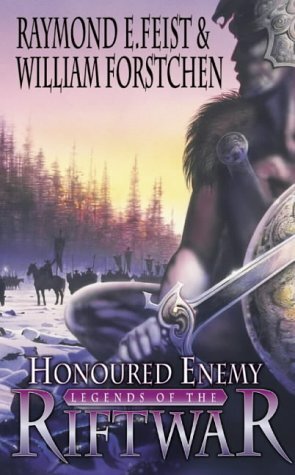
The story is set on the front lines of the Riftwar. A crack unit of Kingdom commandos is stuck in the wilderness in the middle of winter – as is a crack unit of Tsurani infantry. They really want to fight each other, because that’s a) the whole point of the war and b) because the Tsurani murdered the Kingdom captain’s family. But instead the two units are forced to team up to fight against marauding dark elves, in order to survive the winter and make it back to their respective lines. Along the way, of course, the two sides come to reluctantly appreciate each other as fighters and as people – even as friends. There are betrayals, there are touching moments of cultural exchange, there are pulse-pounding action scenes. (Apparently it was written with Sharpe in mind. I wonder why I like it so much.)
This isn’t just the best of the Legends books – it’s one of the best books in the whole Riftwar saga.
Unlike Murder and Jimmy, this is all about the Riftwar. The whole story is that initial war and clash of cultures in miniature – and honestly in some ways it presents that culture clash better than Magician. In that book, it’s either a lone Tsurani – Charles or Kasumi – stuck in the Kingdom, or a lone Midkemian – Pug, or Kevin from the Empire trilogy – stuck on Kelewan. We get an individual’s perspective on these strange new worlds – but in Honoured Enemy it’s an equal balance. We get the perspectives of both the Kingdom and Tsurani captains and their soldiers, dealing with each other in a position of equality. One minute the Tsurani are relying on their Kingdom allies for scouting or stealth in the winter – the next, the Kingdom are falling back on the Tsurani’s combat or engineering skills. They all have reasons to hate each other, and all those reasons are gradually eroded. There are really touching scenes where soldiers who don’t even speak each other’s languages, who have been conditioned to kill each other on sight for almost a decade, sit together at campfires and share a bite to eat. It takes a long time for the Tsurani’s rigid sense of honour to bend enough to accept the Kingdom soldiers as real allies – it takes even longer for the bitter Kingdom soldiers to accept that their enemies are really people. We get to see both sides of the coin in full.
I only wish that the plot could somehow have contrived to bring them all to Kelewan for a bit, instead of having the whole story take place on Midkemia, in order to force the Kingdom soldiers to deal with the Tsurani world. But that would have been one hell of a plot contrivance, so Forstchen is forgiven.
And if that wasn’t enough, there’s also the brilliant subplot of the lead dark elf’s reason for chasing the protagonists: because his own brother (no longer a dark elf – a bit of worldbuilding for another review) is fighting alongside them. It wasn’t enough to have a Kingdom vs Tsurani culture clash, we get a dark elf vs elf culture clash too. It forms a bittersweet counterpoint to the main plot: soldiers from opposite sides of a bitter war are able to make friends, but literal brothers from opposite sides of an even more awful conflict just aren’t able to reconcile.
Honoured Enemy packs everything that makes the Riftwar special as a fantasy series into one short book, and does it in a thrilling package to boot. In many ways, Forstchen writes the actual Riftwar better than Feist.
It was nice to jump back in time briefly to the war that started it all. In publication order, the next thing should be the story of the next generation of characters. But chronologically, there’s something a bit weird that comes first…
Murder in LaMut, written with Joel Rosenberg, is a murder mystery story, and a good one. Three bitter but lovable mercenaries are stuck in the frozen midwinter of LaMut, forced to get involved in local politics – and solve some murders – when all they want to do is get their pay and get the hell out of town. It’s a well-written story, and the three leads are a very charismatic trio. Dry wit, pithy insights on human nature and touching character moments abound. But while it’s an excellent story, full of intrigue and some great character development, it doesn’t feel all that Riftwar-ey. The book’s afterword reveals that the three mercenaries are essentially borrowed wholesale from one of Rosenberg’s other books, and that makes sense. It’s a great standalone fantasy story, but doesn’t really draw much from or add much to the Riftwar overall. But I still very much enjoy it and would recommend reading it, for the banter and the characters if nothing else.
Jimmy the Hand was written with Steve Stirling. On the face of it, I should love it: my last post revealed how much I like Jimmy as a character, and this book is presented as being all about Jimmy. And the bits that are all about Jimmy are really good. We get to properly see the underworld of Krondor for the first time; how the guild of thieves operates, how Jimmy fits in. In the first few pages there’s a gripping prison-break sequence that even manages to fill in a few gaps in the background politics of the original trilogy. So far, so good. Stirling captures Jimmy nicely as a character in his pre-Silverthorn form. I was excited for the rest.
Unfortunately, the story then stops being about Jimmy at all. The book is actually about a farmer’s daughter stumbling across a rural baron resorting to necromancy to resurrect his dead wife. He’s kidnapping children for some nasty blood sacrifice, and said farmer’s daughter has to rescue them and her boyfriend with the help of an undercover witch-hunter and stop the baron’s dastardly plot.
Jimmy the Hand is… also there. Literally. The back two thirds of the story has nothing to do with him whatsoever; he could be completely removed as a character and nothing would change, beyond some different characters having to do some stabbing or sneaking. It doesn’t help that this bit of the story is also just weak: the structure is oddly paced, the characters are a bit flat. Obviously this is a prequel, so it’s very difficult to work in meaningful character development for Jimmy, but there’s no excuse for the others. The first section in Krondor is good, but it feels like Stirling just ran out of ideas and decided to attach a completely unrelated story to the end and just have Jimmy show up periodically. Read the first bit if you must, but then put it back on the shelf.
But then we come to Honoured Enemy, written with William R. Forstchen. It’s actually the one I read first (and the one that was written first), I’m just saving it for the end for dramatic effect. In fact, I think it’s actually the first Riftwar book I ever read, long before I even knew the series existed. 8-year-old me just saw a guy with a sword on the cover at the library and thought ‘yeah that’ll do’.
The story is set on the front lines of the Riftwar. A crack unit of Kingdom commandos is stuck in the wilderness in the middle of winter – as is a crack unit of Tsurani infantry. They really want to fight each other, because that’s a) the whole point of the war and b) because the Tsurani murdered the Kingdom captain’s family. But instead the two units are forced to team up to fight against marauding dark elves, in order to survive the winter and make it back to their respective lines. Along the way, of course, the two sides come to reluctantly appreciate each other as fighters and as people – even as friends. There are betrayals, there are touching moments of cultural exchange, there are pulse-pounding action scenes. (Apparently it was written with Sharpe in mind. I wonder why I like it so much.)
This isn’t just the best of the Legends books – it’s one of the best books in the whole Riftwar saga.
Unlike Murder and Jimmy, this is all about the Riftwar. The whole story is that initial war and clash of cultures in miniature – and honestly in some ways it presents that culture clash better than Magician. In that book, it’s either a lone Tsurani – Charles or Kasumi – stuck in the Kingdom, or a lone Midkemian – Pug, or Kevin from the Empire trilogy – stuck on Kelewan. We get an individual’s perspective on these strange new worlds – but in Honoured Enemy it’s an equal balance. We get the perspectives of both the Kingdom and Tsurani captains and their soldiers, dealing with each other in a position of equality. One minute the Tsurani are relying on their Kingdom allies for scouting or stealth in the winter – the next, the Kingdom are falling back on the Tsurani’s combat or engineering skills. They all have reasons to hate each other, and all those reasons are gradually eroded. There are really touching scenes where soldiers who don’t even speak each other’s languages, who have been conditioned to kill each other on sight for almost a decade, sit together at campfires and share a bite to eat. It takes a long time for the Tsurani’s rigid sense of honour to bend enough to accept the Kingdom soldiers as real allies – it takes even longer for the bitter Kingdom soldiers to accept that their enemies are really people. We get to see both sides of the coin in full.
I only wish that the plot could somehow have contrived to bring them all to Kelewan for a bit, instead of having the whole story take place on Midkemia, in order to force the Kingdom soldiers to deal with the Tsurani world. But that would have been one hell of a plot contrivance, so Forstchen is forgiven.
And if that wasn’t enough, there’s also the brilliant subplot of the lead dark elf’s reason for chasing the protagonists: because his own brother (no longer a dark elf – a bit of worldbuilding for another review) is fighting alongside them. It wasn’t enough to have a Kingdom vs Tsurani culture clash, we get a dark elf vs elf culture clash too. It forms a bittersweet counterpoint to the main plot: soldiers from opposite sides of a bitter war are able to make friends, but literal brothers from opposite sides of an even more awful conflict just aren’t able to reconcile.
Honoured Enemy packs everything that makes the Riftwar special as a fantasy series into one short book, and does it in a thrilling package to boot. In many ways, Forstchen writes the actual Riftwar better than Feist.
It was nice to jump back in time briefly to the war that started it all. In publication order, the next thing should be the story of the next generation of characters. But chronologically, there’s something a bit weird that comes first…
April 17, 2022
Riftwar Re-Read #3 – Silverthorn and Sethanon
I’ve been powering ahead with the Riftwar series – I’ve just finished the third of the Legends books, so that’ll be a review post soon as well. But before I get too carried away, it’s time to talk about the remaining two books of the original saga. Magician might set up an entire universe, but it’s a sufficiently self-contained story to stand very well on its own. But its two direct sequels, Silverthorn and A Darkness at Sethanon, are too intrinsically linked to talk about individually. Though the A-plot of Silverthorn is largely resolved in that book alone, it’s very much a setup for Sethanon.
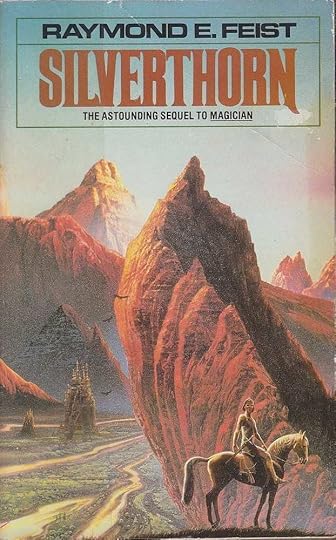
And it’s a damn good setup. Master magician Pug doesn’t take a back seat, per se, but the foreground very much belongs to Arutha, now Prince of Krondor, and ambitious young thief Jimmy the Hand, whose relatively brief appearance in Magician is definitely a highlight of that book. Given how much mileage Feist gets out of the wisecracking Jimmy and his journey – to say nothing of his various descendants – in the series to come, it’s definitely a good thing he took centre stage so early. On the surface, Silverthorn is a much more conventional fantasy adventure than Magician: on their wedding day, Princess Anita is shot with a poisoned arrow – the titular Silverthorn – the only antidote to which is hidden in the northern mountains on the other side of an army of dark elves currently plotting to take over the world. So off trot Arutha, Jimmy, and several other secondary characters from Magician to find the antidote, save the Princess, and stall the dark elf invasion along the way.
Meanwhile, in a plot that sets the tone for Pug’s role in the saga going forward, our favourite magician is off investigating the cause of the aforementioned dark elf invasion. Because of course it’s not just a military matter: dark magic from the beginning of time, twined up with the Dragon Lords, the mysterious Macros the Black, and the good old rifts, are all in play. While Arutha deals with the physical threat, Pug takes on the dark forces in the background, reopening the rift between worlds and uncovering some nicely apocalyptic cosmic threats. As I mentioned back in my first post, this is a basic structure that will be repeated constantly throughout the series: Pug, Tomas and various other magical folk yet to appear take on the cosmic Big Bads, while Arutha and friends, and ultimately their descendants, deal with the Big Bads impact on Midkemia and the Kingdom. And it works well. For the duration of Silverthorn, the plots remain largely separate, as Pug is off playing Magical Sherlock Holmes. But in Sethanon – which I’ll come to in a minute – everything comes together.
I like Silverthorn. Arutha is a well-written slightly broody hero, quick-witted but dour. As is remarked, to my lasting amusement, throughout the series, he “does take the fun out of life.” (He in fact creates more fun by forcing those who remark on this tendency into roles they are suited for but do not desire.) Jimmy the Hand is an absolute delight – I’m sure I’ve unconsciously borrowed a lot from this sarcastic thief to construct Tal Wenlock. And lots of secondary characters from the first book get more time to shine: Pug’s fellow slave Laurie, now a nobleman; Martin the master hunter, some of the background Tsurani magicians. The world is established, and now its inhabitants can play. The quest for the Silverthorn is simple enough, which gives all the characters time to become nicely rounded and realistic, and it all culminates in some nicely epic fight sequences. A plucky band of heroes against the world: what’s not to like?
The only thing I miss in Silverthorn is the presence of the mighty Dragon Lord Tomas, who only shows up briefly at the end. But that’s ok. Because, having learned the identity of the Big Bad in his quest for knowledge, in Sethanon Pug enlists the help of his best friend to fly across the cosmos on dragonback to find Macros the Black at the edge of the universe. Meanwhile, the dark elf invasion set up in Silverthorn actually takes place, and Arutha, Jimmy and co. are kept busy fending it off while Pug, Tomas and Macros race to thwart the end of the world that the invasion’s success will bring. There is prophecy, there is time travel; there’s a genuinely compelling redemption arc for a villainous figure from Magician, there are the returns of several characters who you didn’t realise you missed but definitely make the book better for their presence. And, crucially, Tomas and Pug get to do a cosmic odyssey and kick some serious arse together, which is something I’d been wanting since Magician. In short, Sethanon is a great end to the original saga.
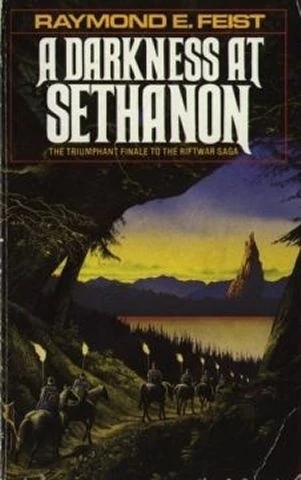
Fundamentally, it shows how good Feist is at worldbuilding and setup. There’s a lot of payoff to this book that I only noticed on this umpteenth reading. The whole dark elf invasion is set up in the first third of Magician – Pug and company have to fight their way through migrating dark elves, whose presence isn’t quite explained by the Tsurani invasion. At the time, everyone has more pressing things on their minds (like the Tsurani invasion) and so the elves get forgotten – but they’re migrating north, of course, to flock to the banner of their new chieftain, who is just beginning the unification necessary to launch the invasion in Sethanon ten years later. Similarly, the Big Bad (whose nature I shall not spoil) has been present as a dark legend since almost the moment Pug sets foot on Kelewan in Magician. The villain-turned antihero? Never seen on-page in Magician, but the primary antagonist for most of Arutha’s plotline in that book, and with all the reasons for his villainy and setup for his eventual redemption laid out in that book – it just takes actually meeting him for all that to become apparent. Similarly, these two books both introduce various characters and concepts that I know will become really important later on in the series.
Feist’s really got some foresight.
They’re not perfect books by any means, of course. There’s perhaps a bit too much ‘I planned all this from the very beginning’ on the part of Macros the Black in particular,, which leads to a bit too much exposition, the climactic final battle suffers from being far less epic than the protracted siege that preceded it (but said siege is really well written), and there are excessive notes of The Power of Friendship in the slightly too-neat final resolution of all the plotlines. While Feist is fantastic at setting things up, he sets up so many things for the future series that there’s not always room to properly set up all the things that end up being important for the immediate plot at hand.
in the slightly too-neat final resolution of all the plotlines. While Feist is fantastic at setting things up, he sets up so many things for the future series that there’s not always room to properly set up all the things that end up being important for the immediate plot at hand.
But fundamentally, Silverthorn and Sethanon are a pair of cracking books. The initial Riftwar saga is complete: two worlds have been exquisitely built, a vibrant cast of characters set up. While we don’t say goodbye to Arutha and company just yet, we’ll never see them in the foreground in quite the same roles ever again – but that’s ok. These two books gave them plenty of spotlight, and they’ve earned a quiet transition to a supporting role for the next generation. Literally. The next pair of books are all about their kids.
Well, after the videogame trilogy, of course. But we’ll get to that later.
And he might not be picking pockets anymore, but we’ve certainly not seen the last of Jimmy the Hand.
April 10, 2022
Rebuilding the Universe. Out of Lego.
Sometimes a day just doesn’t quite go the way you expect it to. For instance, yesterday, when I spent a solid hour and a half discussing the inevitable heat death of the universe and the concept of entropy with a 10-year-old. While building Lego.
It was an interesting day.
It’s been a while since I contemplated the cosmic, as it were, despite literally being in the middle of a short story about a bunch of astronomers on an orbiting space telescope. I’m just getting into some of the objects they’re actually looking at, which consisted of me searching for some cool stuff in space and trying to shoehorn it in. But even though I’d been reading about phenomena halfway across the universe, I hadn’t been thinking about them properly.
Until, that is, the aforementioned conversation with the aforementioned 10-year-old. In which we ran the full gauntlet from light pollution and stargazing to the mechanics of entropy (which I realised I don’t actually know that much about), and how, ultimately, everything in the universe will probably be reduced to dust and ashes floating in the infinite dark.
I would like to reiterate that this conversation was taking place in the middle of a Lego workshop, in which my fellow supervisor and several other children were happily building houses out of plastic bricks and trying not to pay attention to our discussion of how humanity will probably not survive long enough to even see the end of existence itself.
It’s also not the first conversation like this I’ve had with this kid. They are wise beyond their meagre years, and we’ve discussed many things that I’m pretty sure I had no concept of whatsoever at their age, including immortality and why you’d want it, or not. (Aside: in my experience there are 3 stages to one’s attitude to this concept. 1: ‘Wow, living forever sounds amazing!’ 2: ‘I have to outlive everyone I’ve ever loved? No thank you!’ 3: ‘Screw you all, I’m never gonna die!’ I am at stage 3. [With the caveat of ‘as long as I can choose to move on if and when I feel I’ve seen enough of infinity. Everyone go read Surface Detail and watch ‘San Junipero’ from Black Mirror.])
But despite the fact that I profess to write science-fiction, despite the fact that I read so much of it, I haven’t had a proper conversation or properly thought about the real ‘big picture’ concepts that underpin so many of the best works of the genre in a very long time. I’ve been reading a lot of fantasy and comics and lower-concept pieces lately. Most of my conceptual thinking has been about stuff like the Warhammer 40k universe, in which the many, many horrors are visceral and deeply unpleasant to think deeply about – but also very well defined. Servitors and Tyranids are really horrifying to consider the full implications of, but those implications are largely immediate and tangible.
The end of the universe? The quadrillion-year future? That’s something else altogether. That’s real ‘middle of the desert at midnight’ thinking, when you look up into the infinite and see it looking back at you. And it’s terrifying. But it’s wonderful too.
I think it might be time for me to break out the Asimov and the Iain M. Banks and start thinking about humanity’s place in the universe again. Let’s get high-concept, shall we?
In summary, kids are much better conversation than you might think.
April 8, 2022
Free books, anyone?
Nice long Easter weekend coming up. It’d be a shame if you had nothing to read while eating all that chocolate.
What’s that? The Blackbird and the Ghost and its thrilling sequel, Nightingale’s Sword, are both free on the Kindle store from today (the 8th) until Tuesday the 12th of April? Well, isn’t that convenient?
If you fancy catching up with – or starting – the adventures of Tal Wenlock, pick up a copy. And if you read either book and like them, maybe leave a review. It helps a lot.
You might as well, right?
March 27, 2022
Riftwar Re-Read #2 – Magician
After kicking off my journey back through the Riftwar books with something new, I’ve now reread the books that started it all: Magician, Silverthorn and A Darkness at Sethanon. I’m going to save Silverthorn and Sethanon for their own post. They’re direct sequels to Magician, and they do pick up on a lot of the dangling threads from this first book, but they’re much more related to each other than to the first book, especially in terms of the characters they follow. Prince Arutha and Jimmy the Hand take centre stage in books 2 and 3 – but Magician is very much the story of Pug and Tomas.
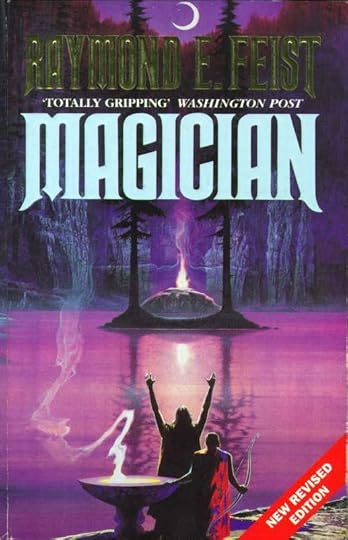 Published in some countries as two books: Magician: Apprentice and Magician: Master. I can see why.
Published in some countries as two books: Magician: Apprentice and Magician: Master. I can see why.‘Who are they?’ I hear you ask? Well, they start off as a pair of apprentices in the castle of a rural nobleman, wanting nothing more than to grow up to become great heroes, like most 12-year-old boys. (I wonder why this influenced me so much when reading them as a 12-year-old boy…) When the keep boys are selected to take up a trade, brash and athletic Tomas becomes a trainee soldier. Weedy, cunning Pug, however, discovers he’s got magic. We’re set up for a nice coming-of-age story: two friends realising their potentials in different ways.
And then, of course, the rift opens. And everything gets turned upside-down.
In short order, Tomas and Pug are separated, and their real journeys begin. Pug is captured by the invading alien Tsurani and enslaved on their homeworld of Kelewan – but he’s still got magic, and when that’s recognised he’s taken away for training and becomes a sorcerer more powerful than anyone on his own home planet. It’s Pug who gets to do the most navigating of the culture clash between the two worlds, jumping from the misery of slavery to being one of the most powerful people on the planet – for the Black Robes of Kelewan are literally outside the law. Pug’s narrative explores this divide really nicely: we see both his outrage at things like slavery and gladiatorial slaughter, and his marvelling at the intellectual society and the technological advancements.
But back on Midkemia, Tomas is busy with more pressing matters. For the Tsurani, the Riftwar is political – for the Midkemians, it’s a desperate fight for survival.
Separated from Pug early in the war, Tomas finds – or is chosen by – an ancient suit of armour that turns him from boy soldier into a peerless warrior. Because, of course, it once belonged to an ancient dragon-riding demigod, one of the Valheru. They were not nice people. The Valheru are essentially all the nasty aspects of the Greek pantheon: cruel tyrants ruling over entire species of slaves, flying dragons through space to annihilate planets just because they’re bored. You will be unsurprised to learn that this suit of armour doesn’t have a positive effect on Tomas. Not helping matters is the fact that there’s a war on, and Tomas is forced to constantly draw on his armour’s powers to win battle after battle. While Pug stands astride two contemporary worlds, Tomas is forced to contend with the worlds of present and past, as he fights to retain his personality – his very humanity – against the spirit of the ancient tyrant that really, really wants to be born again.
Either one of Pug or Tomas’ stories would make a great book on its own. They’re both wonderful examples of classic fantasy concepts given new life by an innovative setting. But Feist manages to make both work and neither feel neglected. And there are several other POVs too: Prince Arutha, the huntsman Martin, Princess Carline, thief Jimmy the Hand and more, all of whom are busy fighting their own corners of the Riftwar. It’s not all dragons and magic: there are sieges to fight and intrigues to foil, and all of them will be important down the line. And let’s not forget the machinations of mysterious sorcerer Macros the Black – which we see only the very start of in this book, but will become more and more apparent – and impressive – as the series goes on.
Having now read the Empire trilogy I also appreciated a lot of the description of Kelewan and Tsurani society a lot more – especially the little throwaway lines describing events that are totally irrelevant to Pug, but absolutely crucial to Mara of the Acoma. Magician is largely focused on the impact of the war on Midkemia, but the Empire trilogy fills in the other side beautifully.
One thing I’d forgotten over the years is just how long the actual Riftwar is – not the series but the conflict. Magician’s narrative spans about a decade, as Pug and Tomas grow from idealistic children to adults. Cities burn and are rebuilt. Characters grow old and die as well as falling in the war. We get to see two societies undergoing fundamental change, as the Riftwar grinds on, and it’s abundantly clear that neither will be the same again.
In summary, Magician is, by itself, enough epic story for an entire series of books, crammed masterfully into a single volume.
And it’s just the first book of 30. It gets better.
March 20, 2022
Comics Are Stupid: That Time Aquaman Was A Swimming Pool
In 2002-3, DC killed off the Justice League. Sort of. The Obsidian Age storyline was a complicated time-travel and magic plot, seeing Tempest (the former Aqualad) sending Atlantis 3000 years into the past in order to save it, Aquaman going back to save them, and the Justice League following him back to save him. This whole scenario is of course the cunning plot of ancient sorceress Gamemnae and her team of less morally restricted superheroes, who beat the snot out of the Justice League and kill them all horribly.
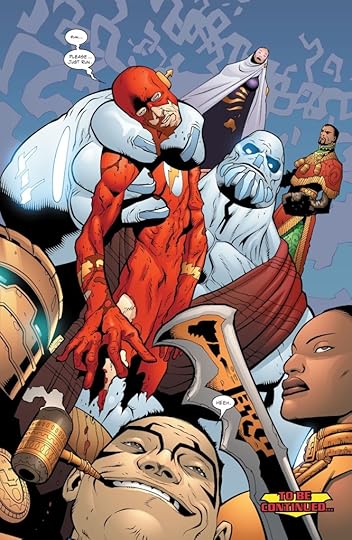 Ouch. JLA #72 (2002)
Ouch. JLA #72 (2002)Through various shenanigans in the past and present, the League are resurrected and everything is restored to normal. Standard comics fare. But there’s one bit of this storyline that leapt out at me as being a delightful representation of just how ridiculous comics can get, if you spend more than 10 seconds thinking about them: Aquaman’s imprisonment in the past.
Aquaman is of course really powerful in water. He’s no slouch on land: he’s got super-strength and durability, is an excellent fighter, and sometimes – oddly – he can even fly. But in water (especially ocean water) he’s even better, able to swim incredibly fast, dive incredibly deep, and of course talk to and command sea-life. (It’s all fun and games until you’re being bombarded by throwing sharks.) So when Gamemnae needs to take Aquaman prisoner, you’d assume she could keep him, say, in a cell on dry land, as far from the water as possible. It’s worked before.
But no. Gamemnae doesn’t do that. Investigating in the past, the Martian Manhunter notices something odd about Gamemnae’s palace. There’s a swimming-pool. In the present day, at the bottom of said swimming pool, the League found this:
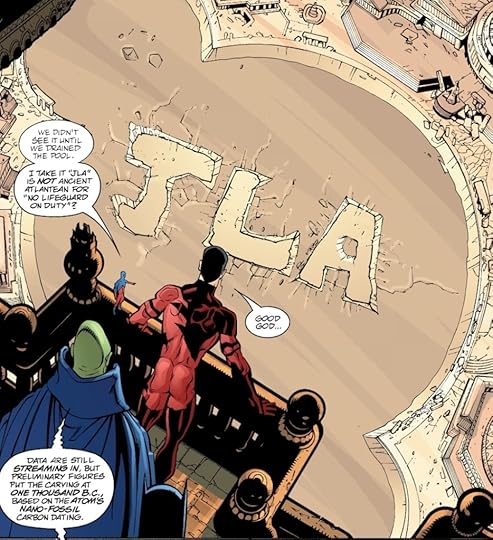 Note also that it’s a really nice pool. JLA #68 (2002)
Note also that it’s a really nice pool. JLA #68 (2002)So off they trot to investigate. And when they dive in, they find none other…
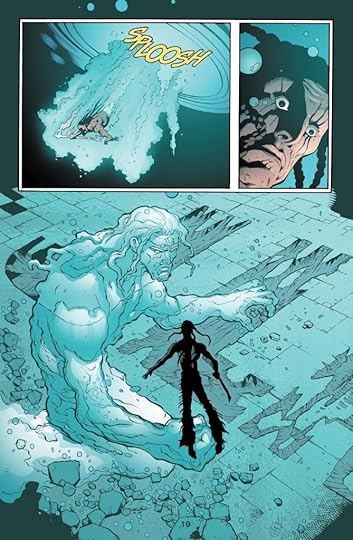 JLA #74 (2002)
JLA #74 (2002)Than Aquaman himself. But you will note that he’s not in the water. He is the water.
Gamemnae has defeated Aquaman – water-themed and water-powered superhero – by turning him into a swimming pool.
Just let that sink in for a moment. (Heh.)
This bizarre punishment is apparently pure torture. To be fair, having your brain turned into water would probably hurt, and sitting helplessly as your mortal enemies lounge at your side sipping cocktails, occasionally hopping into you for a few lengths or for a water-fight would be immensely frustrating. (What would happen if someone accidentally drank some of you?) But this is Aquaman. He’s defined by water. It’s nice and ironic -as Gamemnae notes – but still, you’d think that Aquaman would have some sort of defence against becoming the thing he’s empowered by.
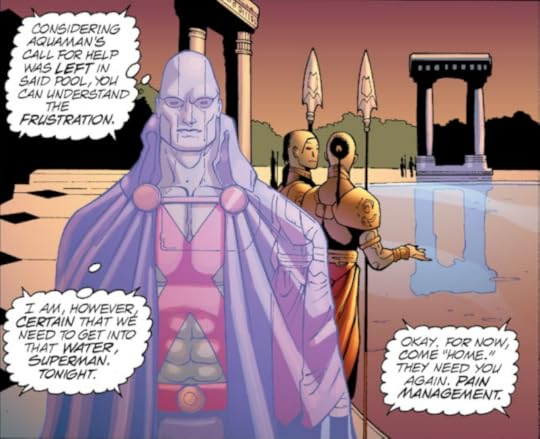 Martian Manhunter (left), Aquaman (right). JLA #70 (2002)
Martian Manhunter (left), Aquaman (right). JLA #70 (2002)In fairness the plan does ultimately backfire. The handwavey explanation for why Aquaman is powerless is that, in swimming pool form, he’s separated from the actual ocean. So when the League connect him to the ocean again, Aquaman finally remembers that he’s supposed to basically be the god of the sea.
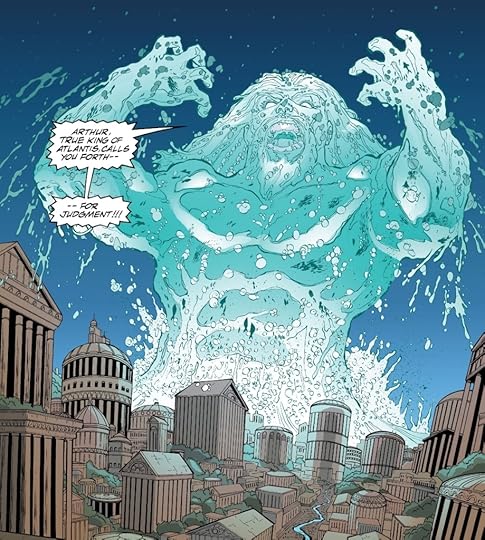 JLA #75 (2003)
JLA #75 (2003)But come on. It might not be the ocean, but that’s a nice pool. It’s big. You could easily grab some guards and drown them instead of just moping while Gamemnae floats across you on a lilo.
Maybe chlorine has been Aquaman’s weakness this whole time?
The Obsidian Age also included one of my favourite mini-arcs in all of DC comics: the backup Justice League. Batman had of course made a contingency plan in case the entire Justice League was trapped 3000 years in the past and presumed dead (because why wouldn’t you). He put Nightwing in charge, and had him pick a new roster from a load of lower-league superheroes. It looked like this:
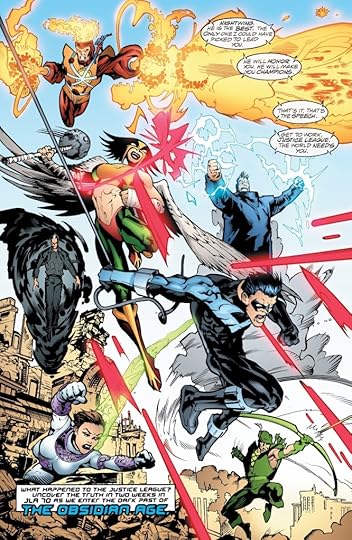 Firestorm, Hawkgirl, Major Disaster, Jason Blood (Etrigan), Nightwing, Faith, Green Arrow. JLA #69 (2002)
Firestorm, Hawkgirl, Major Disaster, Jason Blood (Etrigan), Nightwing, Faith, Green Arrow. JLA #69 (2002)It was a dysfunctional crew, but an effective one. Nightwing stepped up to the leadership role admirably, and the whole team, after a rocky start, gelled very nicely. Green Arrow is always entertaining, Jason Blood and Major Disaster brought an edge of darkness. And Nightwing struggled with his responsibilities, which is always a storyline that works well. I like Nightwing a lot, so I’m never sad to see him in the spotlight.
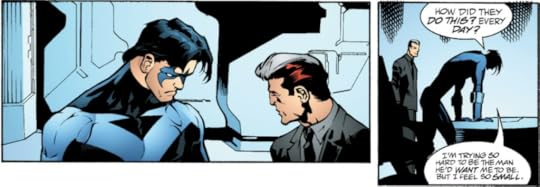 JLA #71 (2002)
JLA #71 (2002)They didn’t last long in the role, of course – a few issues later they’d managed to rescue the main League from prehistory and everything was back to normal again – but it was still a nice insight into a very different set of ‘main heroes’ for the DC universe. I’d have loved to read more of their adventures. (And given that there’s a big event comic called ‘Death of the Justice League’ on the horizon, we might yet…)
There are also profound consequences for Aquaman as a result of this whole mess. When Atlantis goes back to the present, he gets banished – supposedly for being a bad king, but presumably for being stupid enough to let himself get transformed into a swimming pool.
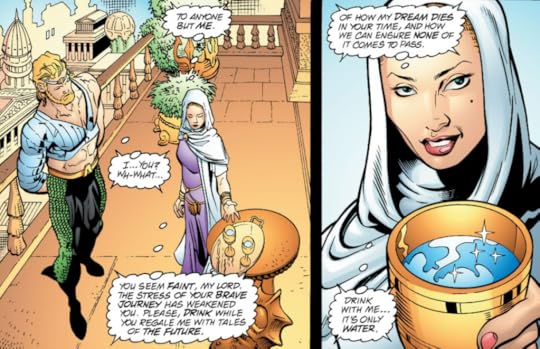 Come on, Arthur. Really? JLA #75 (2003)
Come on, Arthur. Really? JLA #75 (2003)Without him, Atlantis starts going all Lovecraftian and creepy, leaning into the ‘horrors-of-the-deep’ angle that’s stuck around in Aquaman comics – and now his live-action films – to this day. Also he gets a hand made out of water. It’s weird. But this arc kicks off a lot of what makes modern Aquaman Aquaman.
So let us never forget that the modern incarnation of Aquaman, Nightwing’s brief leadership of the Justice League, and the entire Obsidian Age storyline all hinged on Aquaman being subjected to the ultimate torture: decades basking in the summer sun, surrounded by deckchairs and occasionally being urinated in by small children.
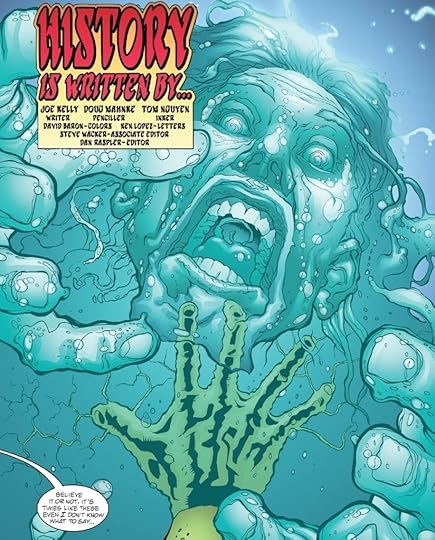 The horror. JLA #72 (2002)
The horror. JLA #72 (2002)I should probably point out that all images in this article are of course copyright DC Comics.
March 18, 2022
Review – The Wood Between The Worlds
Another review is in for Nightingale’s Sword – this time from The Wood Between The Worlds… and it’s a good one!
“even more action-packed and atmospheric than the first… it sure is a great read”
Thank you to Erin Kahn from TWBTW for some very nice feedback and comments – judging by what you’ve liked about the series so far, my ideas for book 3 might be right up your street…
March 13, 2022
2 Reviews: Iron Widow & Legion
I read a fair few books while in Florida, but I wanted to focus on two today for a little review.
The books in question are Xiran Jay Zhao’s Iron Widow, and Brandon Sanderson’s Legion. Both were thoroughly enjoyable reads, and I’d definitely recommend them – but on reflection, I found I found the same problem in both. Which is interesting, given how fundamentally different their plots and styles are.
Iron Widow is essentially a retelling of the story of Empress Wu Zetian, the only legitimate female monarch in China’s very long history. Except everyone is piloting giant anime mechs against hordes of kaiju. You may be able to figure out why I was drawn to this book. It’s a very strong premise, and fundamentally it’s very well realised. There are plenty of allusions to the real history, interspersed with dynamic and exciting scenes of giant robots kicking arse. What’s not to love?
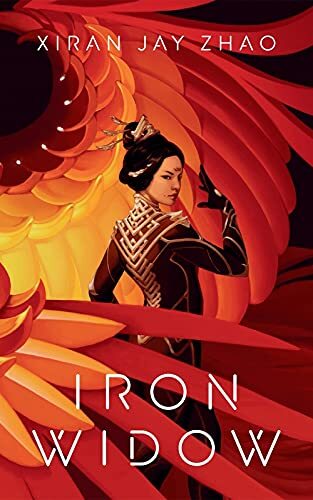
In contrast, the three Legion novellas are a much more grounded affair. Stephen Leeds is a schizophrenic, who hallucinates a large host of people. But instead of being a hindrance, they’re a help, as each one embodies an aspect of Leeds’ intellect: his knowledge of history and culture manifests as the bookish, genteel Tobias; his forensic expertise as the germophobic Ngozi; his survival instincts as the abrasive, foul-mouthed JC. With the aid of this squad of hallucinatory friends, and many more, Stephen Leeds solves crimes. Again it’s a really strong base idea that’s very nicely realised throughout the book – Sanderson is nothing if not thorough in working up his magic systems and the like.
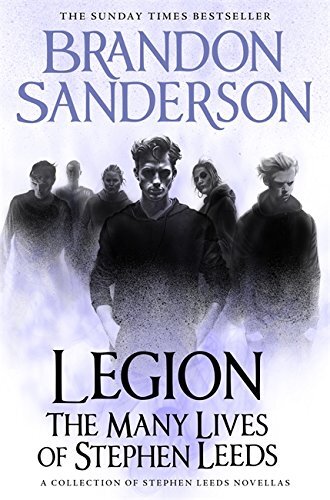
The stories themselves are of course very different. Zetian’s story in Iron Widow is one of bloody-minded vengeance, as she sets out to beat the living daylights out of her patriarchal society and rise from peasant girl to Empress – which is an exaggerated version of what the real Wu Zetian did, only with less mecha. It’s quite a short book, and very focused on Zetian’s viewpoint and feelings throughout, keeping the action flowing and the anger simmering. It really is a book full of righteous rage, and it’s fantastic for it.
Legion is of course three stories rather than one continuous narrative (though they do link together in the last), each following a different case and exploring different aspects – literally – of Stephen Leeds’ personality. As they’re novellas they’re again short, and so again stay tightly focused on the characters themselves – at the expense of background worldbuilding, which is unusual for Sanderson.
That’s the issue I have with both Legion and Iron Widow. They’re short, tight stories, but that means sacrificing a lot of what’s necessary to make a good story great. Legion’s three stories delve into Leeds’ personalities, but there are lots of allusions to darker aspects of his condition that just don’t ever get explored. For Sanderson this is unusual, even for his novellas – usually he still manages to cram in the crucial worldbuilding even in shorter stories. Legion is great, but it should have been three novels, not three novellas.
Iron Widow also lacks this exploration of the background. So laser-focused on vengeance is Zetian that she doesn’t spend any time looking at the world around her. There are brief insights into a really well-realised world – the other mechs and the society around them, the way that humanity has adapted to a world under constant threat from giant monsters. There are a couple of really nice scenes with people playing with action figures of the various giant mechs, or building what are basically gundam kits – just a few scenes delving into things like that would have given the world so much more life. Iron Widow might have benefited from a second perspective, even if it was only for a few chapters, just to give an alternate angle on a very interesting world.
In summation, these are both books well worth reading. But while they’re fantastic stories, they’re not quite fantastic worlds – or if they are, they’re just not properly displayed.
March 6, 2022
The Long, Dark, Breakfast-Time of the Soul
William Gibson once wrote that the feeling of jet-lag is roughly akin to your body having travelled, but your soul moving more slowly.
“Souls can’t move that quickly, and are left behind, and must be awaited, upon arrival, like lost luggage.” – William Gibson, Pattern Recognition
Having now just landed in the UK from America on an overnight flight (but not, unfortunately, having slept for more than about an hour), I know exactly what he means. Something just feels incomplete, and I suspect it will all day.
(As I have barely slept, this post is basically a bit of a ramble.)
I have, after all, travelled 5 hours into the future. And back into the cold (the glorious, glorious cold), which is the appropriate weather for early March, not the ridiculous Floridian oven-temperature I’ve been in for a week.
In some ways the actual time away has been more disorienting than the act of returning; the heat, the time difference, and the strangeness of Florida, its vast size and simultaneous lack of stuff to fill it with…
 I did visit some cool wetlands though. There were alligators. It was neat.
I did visit some cool wetlands though. There were alligators. It was neat.It was a good trip (for work), if a long one. I wasn’t writing anything in particular during it – as I’ve been watching so much Hustle lately I dusted off an old project with some conmen of my own. It’s basically one short story that I’ve been trying very hard to publish for years (I think it’s one of my best; magazines seem to disagree) – I’ve not got an overarching plan for a bigger story, so I’ve just been writing some little vignettes to expand the world and the characters a bit. I’ll do something with it one day.
Now I am returned, and vaguely normal service will resume. I got through most of my reading list – A Memory Called Empire is the only thing I haven’t started yet, but that’s because I picked up volume 2 of Y: The Last Man and also Sanderson’s complete Legion omnibus to tide me over. Also I had the end of Sandman to read. When my brain is more adequately functioning, I’ll write up a review or few.
For now, though, rest, a restoration to my normal keyboard, and a bit of relaxation.



